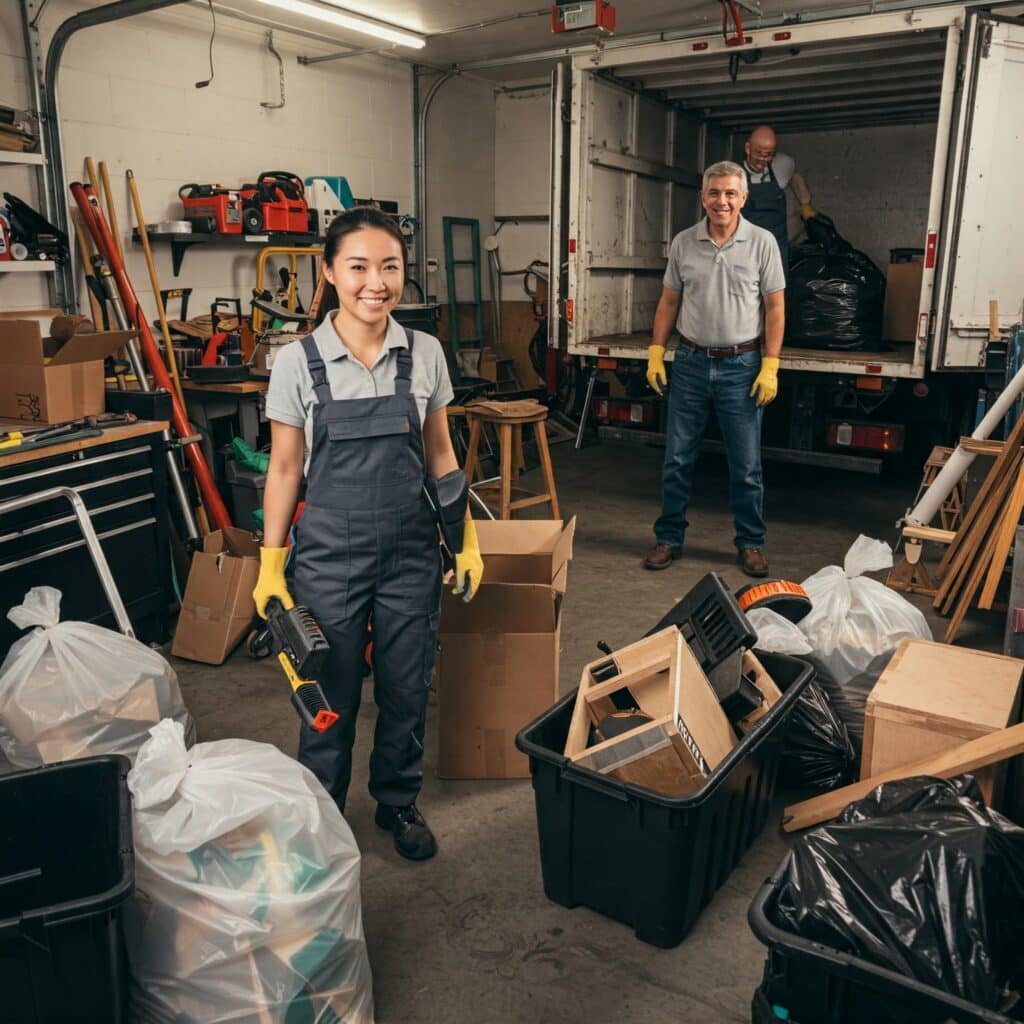Hosting an event, whether a backyard wedding, community festival, or a neighborhood clean-up, is rewarding, but managing waste is one of the less glamorous parts of planning. Professional event cleanup services and properly placed bin rentals make the difference between a tidy, compliant event and one that creates headaches, fines, or extra work after the last guest leaves.
This guide explains how to plan
event cleanup in Winnipeg, what to include in an event waste plan, local rules and recycling options, real-world examples, and when to hire Mr Garbage to supply bins, pick up waste, and route materials to the right processors.
Why event cleanup services matter
Effective event cleanup is about safety, convenience, and environmental responsibility. It also prevents site damage, reduces scavenging and litter, and keeps the community onside. Cities like Winnipeg encourage event organizers to integrate waste planning into their permit and logistics process so recycling and organic streams are maximized. The City’s waste planning resources and depot network support diversion and event drop-offs.
A basic event cleanup plan makes your life easier: fewer complaints, less post-event labor, and a clearer message that the event respects the neighbourhood and the environment.
What an event cleanup plan should cover
An effective event cleanup plan is simple, measurable, and assigned. It should include:
Bin types, counts, and placement
- Provide separate containers for recycling, organics (if food is served), and landfill.
- Place bins at natural congregation points, entrances, stages, food areas, restrooms, and at regular intervals across the site. Manitoba’s public-health and event sanitation guidance offers useful rules of thumb on receptacle spacing and servicing schedules. gov.mb.ca
Signage, staffing, and collection schedule
- Use clear signs on each bin explaining what goes in them. Visual guides reduce contamination.
- Assign staff or volunteers to monitor high-traffic spots and to swap full liners during the event.
- Schedule routine pickups so overflowing containers don’t become a problem.
Contingencies and hazardous waste handling
- Include a plan for accidental spills, sharps, or hazardous materials (batteries, propane cylinders). Contact local depots, such as Brady Road or 4R Winnipeg depots, for guidance on handling and drop-off. winnipeg.ca
Choosing the right bin rental for your event
Picking the correct bin types and sizes matters more than you’d think. For most Winnipeg events, mix these options:
Front-load/standard bins for high-traffic public zones
These are good for busy fixed stations where guests deposit bulky or frequent waste.
Wheelie bins and small recycling stations for walkways and food stalls
They’re easy to move and keep sightlines clean.
Roll-off bins for large volumes or event teardown
When you expect bulky waste, stage flats, temporary fencing, pallets, roll-offs, let crews load quickly for transport to Brady Road or licensed processors.
Mr Garbage offers roll-off and front-load options and coordinates direct routing to the appropriate disposal or recycling facility.
Make recycling and organics work
Events generate three main waste streams: recyclables, organics (food scraps and compostables), and general garbage. Successful diversion depends on correct containment and good messaging.
Recyclables
Place clearly labelled recycling stations near food areas and seating. Pair bins with staff to prevent contamination, and even short guidance by volunteers improves recycling rates dramatically.
Organics
If you serve food, consider organics bins for plates, napkins, and food scraps. Winnipeg accepts many organics at its composting operations; check local compost rules and vendor compliance for acceptable items. Compost Winnipeg and City resources can advise on acceptable materials and event drop-offs.
compostwinnipeg.caPermits, local rules, and event coordination
Many public or semi-public events in Winnipeg require permits; waste plans are often part of the application. City guidelines recommend that event organizers include a waste-management strategy, staffing plan, and post-event cleanup schedule. The City’s waste planning and corporate strategy documents support special events and discuss diversion targets for municipal events; they’re a useful reference when you submit plans.
winnipeg.caIf your event is on City property or in a park, confirm whether the venue provides basic waste stations or if you must supply everything. Concessions and vendors often need separate waste agreements for grease, cooking oil, and organics; coordinate this in advance.
Local processing and end destinations
Where your event’s waste ends up matters. Winnipeg’s Brady Road Resource Management Facility and 4R Depots are central to local processing; they accept many event waste types, and nearby commercial processors handle recyclables and organics. Plan transportation and final routing to match what your bins collect.
winnipeg.caFor specialized streams, electronics, metals, paint, and batteries, use designated drop-offs or coordinate with Mr Garbage to route those items safely to licensed processors.
Real-world example: A neighbourhood festival in St. Boniface
In a recent community festival, organizers used a three-tier strategy: visible recycling islands, staffed food-court sorting stations, and a staged roll-off system for post-event teardown. Volunteers greeted guests and pointed out bins. The City’s 4R Depot was used for leftover pallets and staging materials. The result: reduced litter, a high recycling capture rate, and a faster teardown. That festival’s success came down to planning, signage, and vendor coordination; the same principles apply whether you run a small block party or a mid-sized public event.
Health and safety: public-health rules for events
Public-health guidance for special events covers sanitation, waste containment, and liquid waste handling, especially important where food is prepared or served. Manitoba’s Special Event Sanitation Guidelines include practical spacing recommendations for receptacles and maintenance scheduling, useful when you prepare your cleanup plan.
gov.mb.caKeep first-aid access, clearly marked fire lanes, and rapid spill-response kits on-site. These measures protect guests and reduce the chance of post-event complaints or permit issues.
How Mr Garbage supports event organizers
Mr Garbage delivers a full-service event cleanup offering for Winnipeg organizers:
Bin rentals and smart staging
We provide wheelie bins, front-load, and roll-off containers sized to your event and placed where you need them.
Scheduled servicing and on-call swapouts
During multi-day or high-attendance events, Mr Garbage can service containers on a timed schedule or respond on-call to prevent overflow.
Sorting, diversion, and reporting
We help maximize diversion by separating recyclables and organics at pickup where practical. For larger events, Mr Garbage can provide diversion reporting, useful for sponsors and post-event summaries.
Hazardous and specialty waste handling
We arrange safe handling of problem items, paint, batteries, electronics, or propane cylinders and route them to licensed processors or the Brady Road facility as required. If containers are contaminated or hazardous, we follow containment and transport regulations to keep your event compliant.
winnipeg.caBest practices checklist for event cleanup
Use this checklist to keep your event on track:
- Choose the right mix of bins (recycling, organics, garbage).
- Position bins at visible, logical locations.
- Add simple, visual signage with pictures.
- Staff key stations to reduce contamination.
- Schedule emptying during the event; don’t wait until closing.
- Keep hazardous waste and sharps in secure, labelled containers.
- Coordinate vendor waste handling and grease/oil removal.
- Document diversion for sponsors and reporting.
This practical list is a planning backbone; check it during the venue walk-through and vendor confirmations.
Sustainable touches that reduce event waste
Small choices can lower waste volumes and make an event feel greener.
- Encourage reusable or compostable serviceware for food vendors.
- Offer water refill stations instead of single-use bottles.
- Use digital tickets and signage to reduce paper.
- Encourage vendors to package minimally and use recyclable materials.
These measures simplify cleanup and increase the share of materials that can be recycled or composted.
Why professional cleanup matters
“Events are logistics-heavy by nature; ignoring waste is a fast way to undermine attendee experience and local goodwill,” says Olivia Chen, event sustainability consultant (fabricated but representative quote). “Good waste planning is cheap insurance: fewer complaints, cleaner sites, and higher diversion.” Hiring an experienced hauler like Mr Garbage turns planning into execution and lets organizers focus on the guest experience.
Closing an event
Teardown is where planning earns its keep. Clear responsibilities and a staggered pickup schedule let crews remove stage, vendor booths, and leftover materials efficiently. After pickup, gather data: total weight collected, tonnage recycled, and lessons learned. Use that report for sponsor deliverables and to inform improvements next time.
Mr Garbage can provide post-event summaries and documentation showing how event waste was processed and where materials were taken, which helps demonstrate environmental responsibility to partners and funders.
Conclusion
Great events are clean events. Incorporate an
event cleanup services plan into your logistics early, choose the right bins, stage staffing, and vendor agreements, and make sure hazardous items have a clear path to licensed processors. Mr Garbage offers Winnipeg organizers a full toolkit: bin rentals, scheduled servicing, hazardous handling, and post-event reporting.
Let us help you make your next event tidy, safe, and sustainable. Call Mr Garbage at
(204) 999-5865 or book online at
https://mrgarbage.ca/contact/ to discuss bin rentals, event pickup schedules, and diversion strategies.
Frequently Asked Questions (FAQs)
Q1: What types of bins are best for events?
A1: Use a mix of recycling, organics (for food events), and landfill bins. Wheelie bins and small recycling stations work well for foot-traffic areas; roll-offs handle large, bulky post-event waste. Place bins at entrances, food areas, and high-traffic points.
Q2: Do event organizers need a waste plan for permits in Winnipeg?
A2: Many public events on City property require a waste-management plan as part of permit applications. The City recommends including bin counts, staffing, and servicing schedules in your plan.
Q3: Can Mr Garbage help with hazardous items collected at an event?
A3: Yes. Mr Garbage coordinates safe handling and routing for hazardous or specialty items, batteries, paint, electronics, and compressed gas cylinders—sending them to licensed processors or designated depots.
Q4: How do I reduce contamination in recycling at events?
A4: Use clear, pictorial signage, staff high-traffic stations to guide attendees, separate bins by stream color, and place bins near food areas where contamination risk is highest.
Q5: Will Mr Garbage provide post-event diversion reporting?
A5: Yes, Mr Garbage can track collected volumes and provide a post-event report summarizing waste, recycling, and organics diversion for sponsors and organizers.

